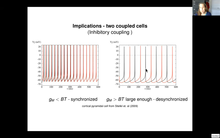The videos from Brain Day 2023 are now available on line at our youtube channel. Hope you enjoy.
Quincy Almeida
Wilfrid Laurier University
Parkinson’s Disease: Sensorimotor Transformations through a Degenerating Circuit
While it is well known that a variety of neural networks are essential for the planning and control of human movement, the interaction between sensory, perceptual and cognitive networks is not easy to disentangle. Vision is critical to all of these processes, and required to accurately detect and make judgments about objects and obstacles that we interact with. Vision is also needed to interpret the progression of successful (or unsuccessful) planned movements relative to environmental obstacles or threats. In addition, higher level cognitive processes (attention, executive function) are required for recognition and semantic processing of environmental stimuli.
Interestingly, while the neural networks for all of these systems are known to anatomically loop through the circuitry of the basal ganglia (BG), little is known about how basal ganglia dysfunction, as in Parkinson’s disease, might mechanistically influence movement control. This talk will consider the controversies related to how movement might be compounded by interactions between these processes.
One example that is highly related to vision is freezing of gait (FOG). It is considered one of the most debilitating symptoms associated with Parkinson’s disease (PD), yet there is considerable debate about the underlying mechanisms of FOG. Research has demonstrated that vision can have a tremendous impact on FOG episodes. In some cases, FOG is improved by enriching the visual environment with step cues, yet in other circumstances the richness of the visual (and sensory) environment is the very trigger of FOG (e.g. narrow doorways, cluttered spaces, visual or auditory dual tasks). Thus, there is a debate as to how visual environments actually influence movement deficits (such as FOG), and many different mechanisms have been suggested including: cognitive-attentional, sensory-perceptual, and anxiety-provoking processes. Yet the inter-relationship between these processes needs to be more carefully and thoroughly investigated.
In order to understand how visual stimuli may be associated with these different theories, a series of experiments will be presented that examines gaze behaviors during gait, in FOG-assisting and/or FOG-triggering environments. Gaze behaviors will then allow us to examine how gait deficits are associated. Results will be discussed in terms of understanding the underlying mechanisms that contribute to FOG.
200 University Avenue West
Waterloo, ON N2L 3G1
Canada







